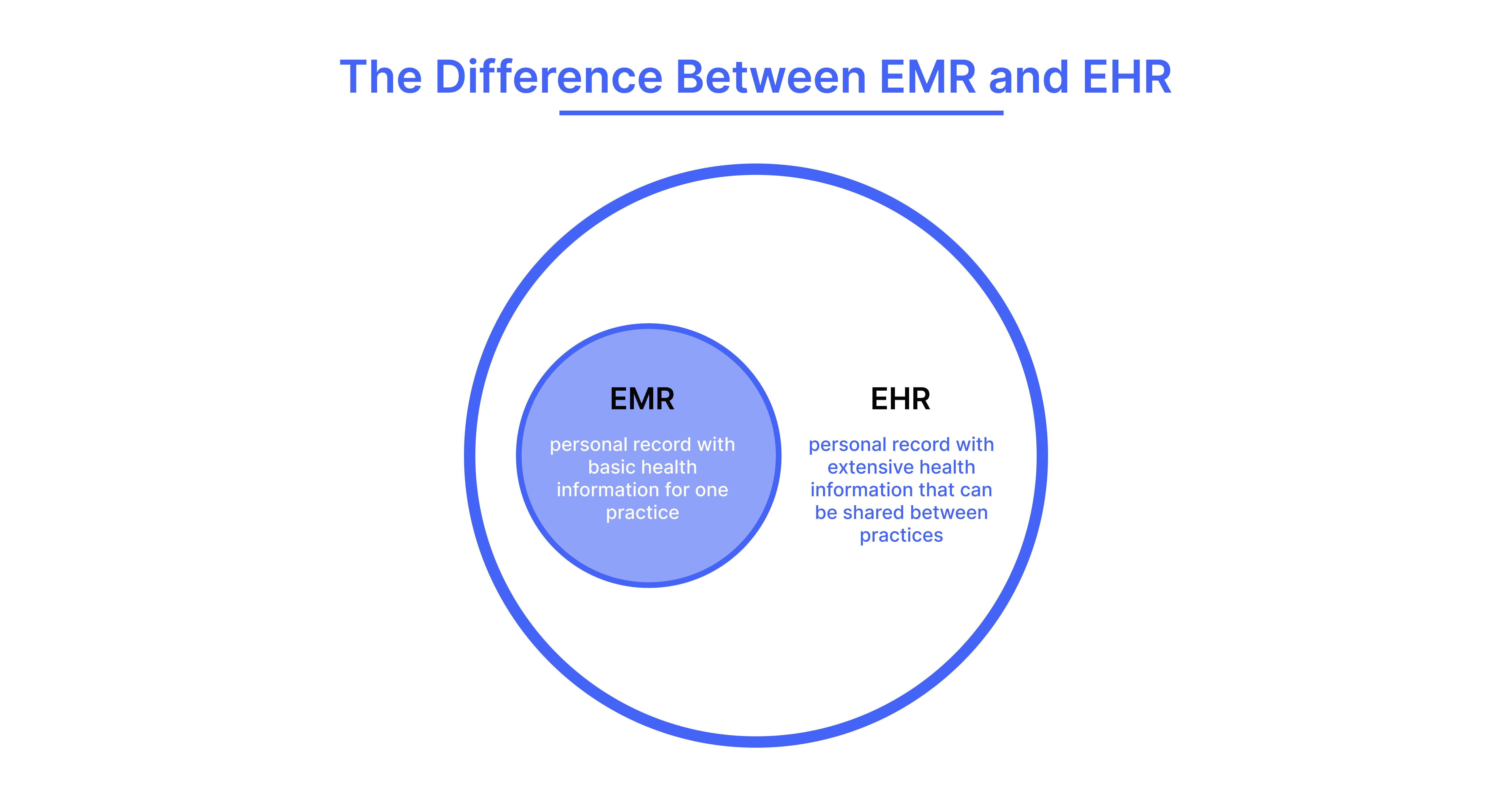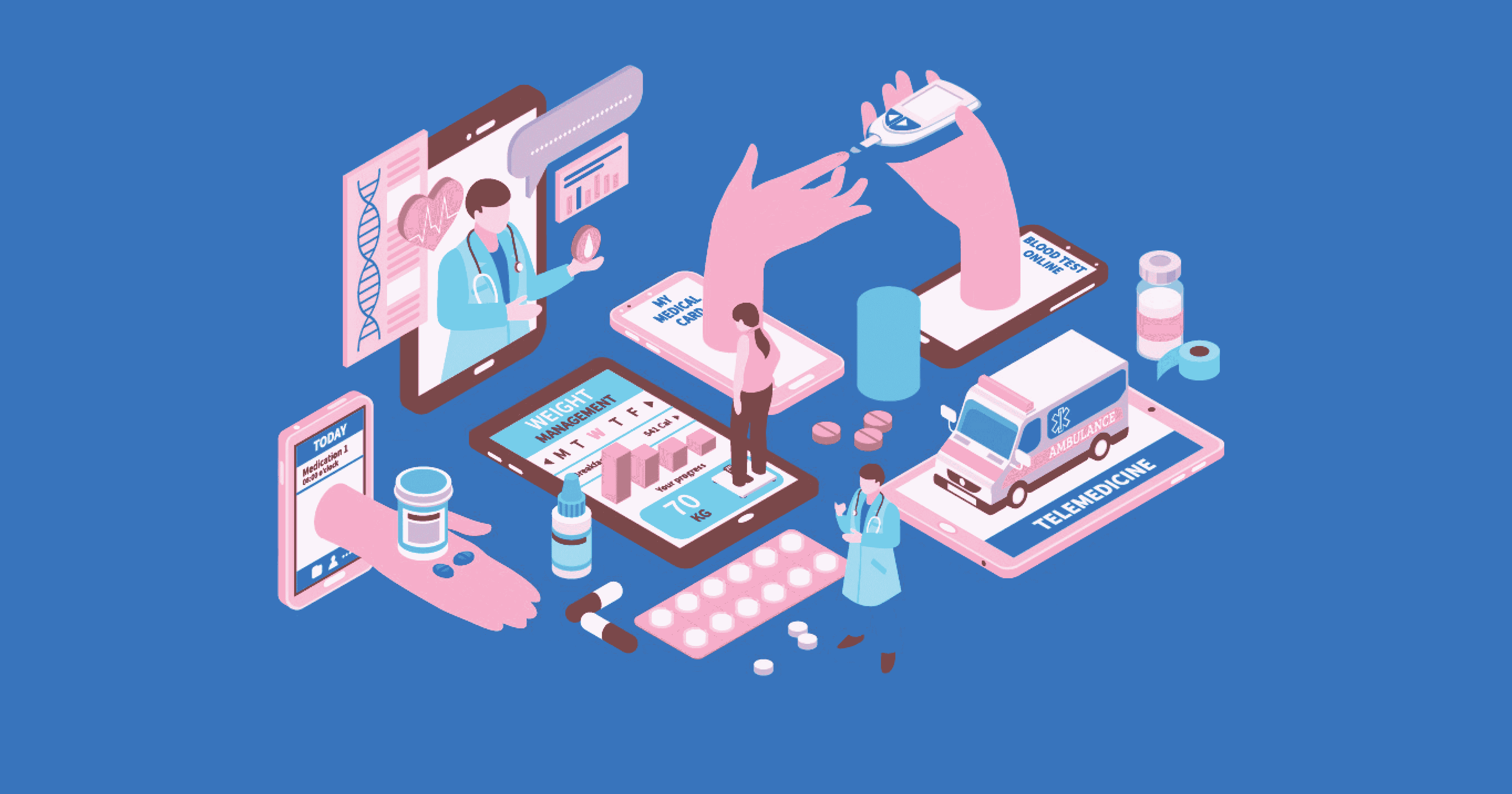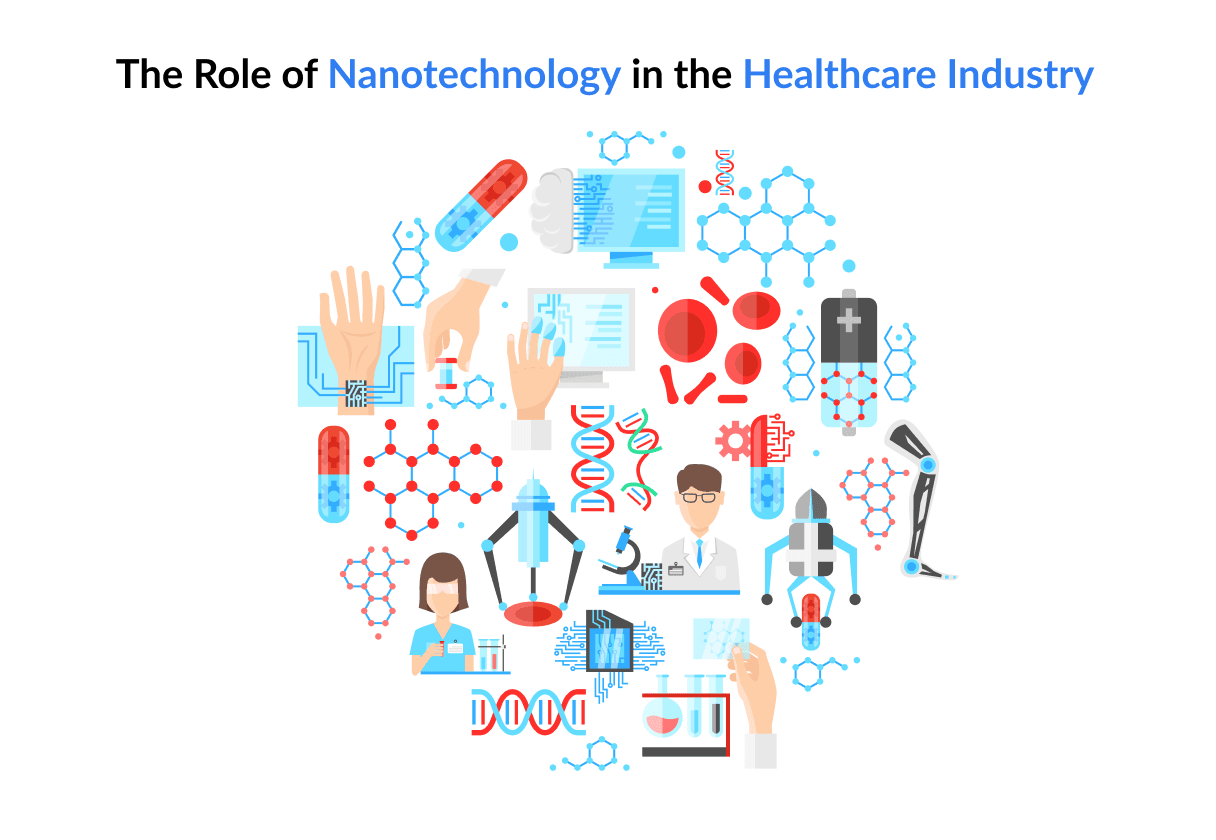Introduction
Big data analytics is a revolutionary tool that can be used to improve healthcare outcomes by leveraging data-driven insights to enhance clinical decision-making, improve patient care and outcomes, and optimize resource utilization.
Big data analytics is a revolutionary tool that can be used to improve healthcare outcomes by leveraging data-driven insights to enhance clinical decision-making, improve patient care and outcomes, and optimize resource utilization.
In the healthcare sector, big data analytics provides valuable insights into patient data, which can be used to identify trends, patterns, and correlations that can be used to drive effective decision-making.
This blog explores how big data analytics is being used in the healthcare sector to improve patient outcomes. It examines the different ways in which healthcare providers are leveraging data to identify and address healthcare challenges, improve the quality of care, and enhance patient outcomes.
Why is Big Data Analytics Important in the Healthcare Industry?
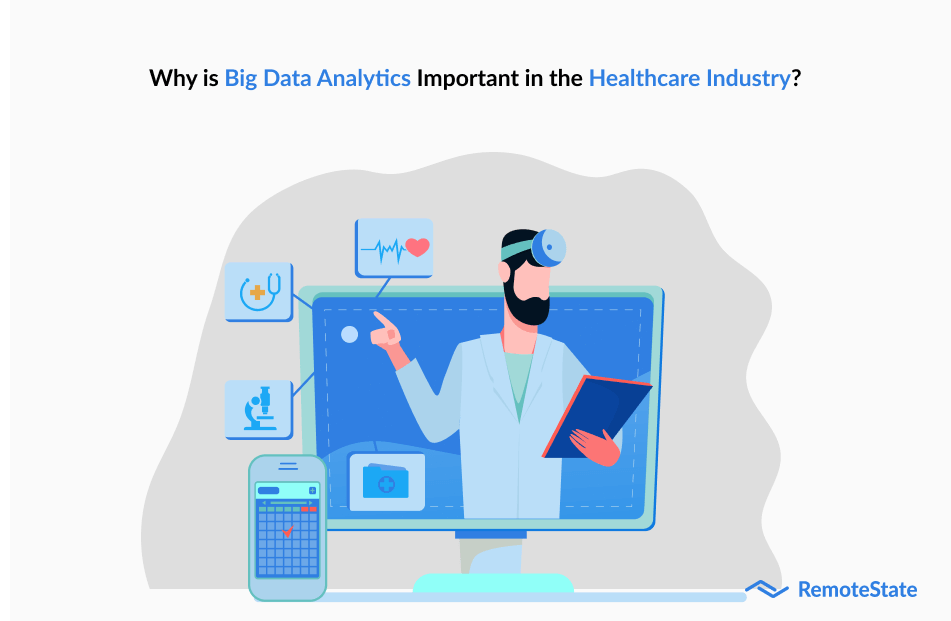
The healthcare industry is rapidly evolving, and healthcare providers need to stay ahead of the curve to provide the best possible care to their patients. Big data analytics can provide valuable insights into patient data, enabling healthcare providers to identify trends, patterns, and correlations that can be used to drive effective decision-making.
One of the biggest advantages of big data analytics in healthcare is the ability to predict and prevent diseases. By analyzing large volumes of patient data, healthcare providers can identify patients who are at risk of developing a particular disease and take proactive measures to prevent it.
This can help to improve patient outcomes, reduce the cost of healthcare, and save lives.
Additionally, big data analytics can help to improve the quality of care provided to patients. By analyzing patient data, healthcare providers can identify areas where care can be improved and take steps to address these issues. This can help to reduce medical errors, prevent adverse events, and improve patient satisfaction.
How Big Data Analytics is Being Used in the Healthcare Industry?
Big data analytics is being used in various ways in healthcare. Some of the most common applications of big data analytics in healthcare include the following:
Population Health Management
Population health management involves using data to identify and manage the health of specific populations. By analyzing data on patient populations, healthcare providers can identify areas where health risks are higher and take proactive measures to address these issues. This can help to reduce the incidence of diseases, improve patient outcomes, and reduce healthcare costs.
Predictive Analytics
Predictive analytics involves using data to predict future outcomes. In healthcare, predictive analytics can be used to identify patients who are at risk of developing certain conditions and take proactive measures to prevent them. This can help to improve patient outcomes, reduce healthcare costs, and save lives.
Clinical Decision-Making
Big data analytics can be used to improve clinical decision-making by providing healthcare providers with valuable insights into patient data. By analyzing patient data, healthcare providers can identify trends, patterns, and correlations that can be used to make informed decisions about patient care.
Resource Optimization
Big data analytics can be used to optimize resource utilization in healthcare. By analyzing data on resource utilization, healthcare providers can identify areas where resources are being underutilized or overutilized and take steps to address these issues. This can help to reduce waste, improve efficiency, and reduce healthcare costs.
Personalized Medicine
Personalized medicine involves using patient data to tailor treatment plans to the individual needs of each patient. By analyzing patient data, healthcare providers can identify the most effective treatments for individual patients, reducing the risk of adverse events and improving patient outcomes.
Examples of Big Data Analytics in the Healthcare Industry
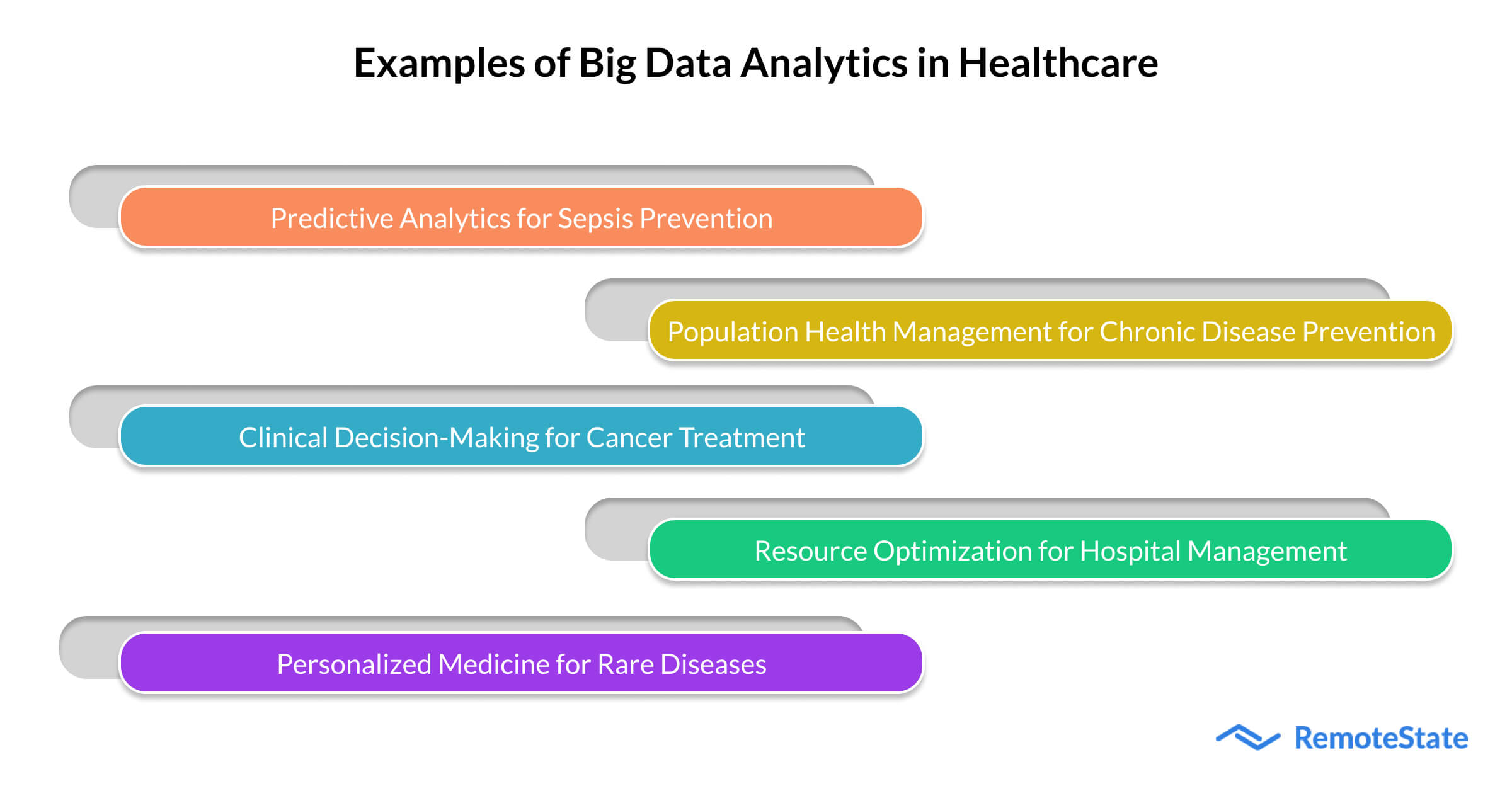
There are numerous examples of big data analytics being used in healthcare to improve patient outcomes. Some of the most notable examples include:
Predictive Analytics for Sepsis Prevention
Sepsis is a potentially life-threatening condition that occurs when the body's response to infection causes damage to its tissues and organs. By using predictive analytics to identify patients who are at risk of developing sepsis, healthcare providers can take proactive measures to prevent it. For example, they can prescribe antibiotics or other medications to prevent infection, monitor vital signs more frequently, or provide additional support to prevent sepsis from occurring.
Population Health Management for Chronic Disease Prevention
Big data analytics can be used to manage chronic diseases such as diabetes, hypertension, and heart disease. By analyzing patient data, healthcare providers can identify patients who are at risk of developing these conditions and take proactive measures to prevent them. For example, they can provide lifestyle counseling, prescribe medication, or offer other interventions to prevent the onset of chronic diseases.
Clinical Decision-Making for Cancer Treatment
Big data analytics can be used to improve clinical decision-making for cancer treatment. By analyzing patient data, healthcare providers can identify the most effective treatments for individual patients based on their specific characteristics, such as age, gender, and genetic makeup. This can help to improve patient outcomes, reduce the risk of adverse events, and improve overall survival rates.
Resource Optimization for Hospital Management
Big data analytics can be used to optimize hospital management by analyzing data on resource utilization. Healthcare providers can use this data to identify areas where resources are being underutilized or overutilized and take steps to address these issues. For example, they can adjust staffing levels, allocate resources more efficiently, or implement new processes to reduce waste and improve efficiency.
Personalized Medicine for Rare Diseases
Big data analytics can be used to develop personalized treatment plans for patients with rare diseases. By analyzing patient data, healthcare providers can identify the most effective treatments for individual patients based on their specific genetic makeup, symptoms, and other factors. This can help to improve patient outcomes and reduce the risk of adverse events associated with traditional treatment options.
Challenges of Big Data Analytics in the Healthcare Industry
Despite the numerous benefits of big data analytics in healthcare, there are also significant challenges to overcome. Some of the most significant challenges include the following:
Data Quality and Privacy Concerns
One of the biggest challenges of big data analytics in healthcare is ensuring the quality and privacy of patient data. Healthcare providers must ensure that patient data is accurate, complete, and secure to avoid potential legal or ethical issues.
Integration of Data from Multiple Sources
Big data analytics requires data from multiple sources to be integrated and analyzed together. However, integrating data from different sources can be challenging, particularly when data is stored in different formats or different locations.
Lack of Standardization
Data in the healthcare industry is often not standardized, which can make it difficult to analyze and compare across different providers or systems. This lack of standardization can limit the effectiveness of big data analytics in healthcare.
Technical Expertise
Big data analytics requires specialized technical expertise to develop and maintain the necessary infrastructure and algorithms. This can be a challenge for healthcare providers who may not have the necessary resources or expertise to implement and manage big data analytics systems.
Conclusion
Big data analytics is a powerful tool that has the potential to transform healthcare by improving patient outcomes, reducing healthcare costs, and optimizing resource utilization. By analyzing large volumes of patient data, healthcare providers can identify trends, patterns, and correlations that can be used to drive effective decision-making.
While there are significant challenges to overcome, the benefits of big data analytics in healthcare are clear. As the healthcare industry continues to evolve, big data analytics will become increasingly important in helping healthcare providers provide the best possible care to their patients.
Unlock the Power of Big Data Analytics in the Healthcare Industry with Remotestate!
Remotestate can help healthcare providers to harness the power of big data analytics. Our team of experts has the technical expertise and experience to develop and maintain the necessary infrastructure and algorithms to analyze large volumes of patient data.
We can help healthcare providers to integrate data from multiple sources, standardize data, and ensure data quality and privacy. By doing so, we can help to overcome the challenges of big data analytics in healthcare and enable healthcare providers to make more informed decisions and provide better care to their patients.
Our services can also help healthcare providers to optimize resource utilization, improve clinical decision-making, and develop personalized treatment plans for patients with rare diseases. With our help, healthcare providers can improve patient outcomes, reduce healthcare costs, and provide the best possible care to their patients.
FAQ's
What is big data analytics in healthcare?
Big data analytics in healthcare involves using data-driven insights to improve patient outcomes, reduce healthcare costs, and optimize resource utilization. By analyzing patient data, healthcare providers can identify trends, patterns, and correlations that can be used to drive effective decision-making.
How is big data analytics used in healthcare?
Big data analytics is used in various ways in healthcare, including population health management, predictive analytics, clinical decision-making, resource optimization, and personalized medicine for rare diseases. By analyzing large volumes of patient data, healthcare providers can identify trends and patterns, and make data-driven decisions that can improve patient outcomes.
What are the benefits of big data analytics in healthcare?
The benefits of big data analytics in healthcare include improved patient outcomes, reduced healthcare costs, optimized resource utilization, and personalized medicine for rare diseases. Big data analytics can help healthcare providers make more informed decisions and provide better care to their patients.
What are the challenges of big data analytics in healthcare?
The challenges of big data analytics in healthcare include data quality and privacy concerns, integration of data from multiple sources, lack of standardization, and technical expertise. Healthcare providers must ensure that patient data is accurate, complete, and secure to avoid potential legal or ethical issues.
How can healthcare providers overcome the challenges of big data analytics?
Healthcare providers can overcome the challenges of big data analytics by ensuring data quality and privacy, integrating data from multiple sources, standardizing data, and investing in specialized technical expertise to develop and maintain big data analytics systems.
What is the future of big data analytics in healthcare?
The future of big data analytics in healthcare is bright. As the healthcare industry continues to evolve, big data analytics will become increasingly important in helping healthcare providers provide the best possible care to their patients. With advances in technology and data analysis techniques, big data analytics has the potential to revolutionize healthcare and improve patient outcomes on a global scale.
Publication Date
2023-03-27
Category
Healthcare
Author Name
Rahul Agrawal
